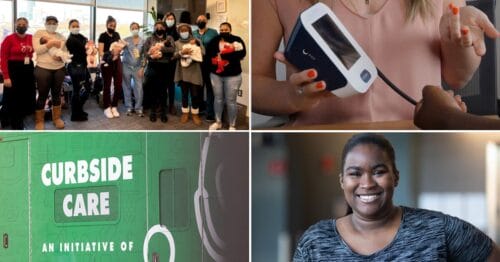Birth Sisters: The Case for Hospital-Supported Doula Programs
April 11, 2023

Getty Images
It's already clear that doulas provide an opportunity to boost birth equity, but to truly do that, the doulas themselves must be championed by healthcare systems.
In every culture, birthing people have historically given birth surrounded by their community. For years, midwives, mothers, grandmothers, sisters, and friends attended to birthing people both before and after birth to offer support, wisdom, and care. It’s only in the past hundred years that birth shifted from the home to the hospital. And with that shift, birthing people generally became more isolated, surrounded by a medical team instead of family or community.
The Birth Sisters program at Boston Medical Center (BMC) was created to replicate a version of community support in modern birthing, offering “sister-like” support during pregnancy, childbirth, and the postpartum period.
“Birth Sisters was designed to recruit women who were representative of the communities that BMC served and that were known to be at risk for poorer pregnancy outcomes,” says Catherine Walker, CNM, MPH, co-founder of Birth Sisters.
But the program also had another goal: “We wanted it be a steppingstone for those who were from communities not well represented in healthcare to move beyond being a Birth Sister into other healthcare careers, if they so desired.”
Supporting community wellness and health equity in labor and delivery
Walker helped establish Urban Midwife Associates, a small practice at BMC in 1993, and immediately she recognized the need for doulas.
“We had created the practice specifically to address inequitable outcomes, especially in neighborhoods of color and among other traditionally underserved populations in the Boston area,” she says. “We saw the idea of a doula program as being crucial to that.”
At that time, says Walker, the term “doula” was well known among white birthing activists but was not a term well-known within the Black and Latina communities BMC served.
“[“Doula”] didn’t say what we wanted it to say, so we came up with the name Birth Sisters because that’s what it was all about,” Walker says. “Most of the doulas in Massachusetts at the time were just birth doulas. This was very specifically designed to be with birthing people prenatally, intrapartum, and postpartum, so that it would cover at least the whole childbearing year.”
Walker, in collaboration with the then-chair of OB/GYN, Phil Stubblefield, MD, and the then-director of the midwifery service at BMC, Jean Ewan, decided to create a hospital-based doula program from this model and hold a training program for people in the community.
“We put a one-sentence ad in a now-defunct free paper in Dorchester that said, ‘Have you always wanted to help other women when they give birth? Call BMC.'” Walker recalls. “From that one little ad, we got 100 responses, and 60 women stuck with the program. It was a very diverse group.”

<em>The first class of Birth Sisters. (Credit: Catherine Walker)</em>
Dona Rodrigues, CNM, director of the Birth Sisters program echoes Walker’s sentiments on the purpose of the doula program and highlights how they aimed to lift up community members into viable career paths and, in turn ideally, financial stability.
“Our goal was to recruit women from the community that looked like the birthing person, spoke their language, or knew what it was like to live in their community,” says Rodrigues. “So, we were recruiting people that weren’t always doula-trained already. They might have worked in the community or given birth at BMC and wanted to give back. And we were also giving them, if they wanted, a possible career path—and several Birth Sisters have gone into nursing or midwifery.”
Building community careers through the Birth Sisters doula program
Onyemaechi Onyekwu, CNM, is one of those Birth Sisters. She was introduced to the program when she met Rodrigues at a summer enrichment class as a high school student in Boston.
“I knew I wanted to try it because I always had a passion for midwifery and women’s healthcare,” she says. “Dona got me on board with the program, and I was a Birth Sister in high school and all throughout college at Boston University. And the whole time I knew I really loved this work and wanted to do whatever I needed to further myself in this work.”
After graduating, Onyekwu went on to nursing school and then midwifery school, all the while continuing to participate in the Birth Sisters program as much as she could, even if it was simply recruiting new Birth Sisters to the program. She credits Rodrigues with supporting her career growth, as well as her own grit and determination to seek out people and programs within BMC that helped guide her studies: “Having Dona put me in rooms where various providers could see my face and get to know me was a huge driving factor.”
“I have always loved everything about childbirth and pregnancy and helping other women that look like me,” Onyekwu says, “Now, I’m a midwife at BMC, and I’m working with other Birth Sisters in birth. I couldn’t ask for anything else.”
Onyekwu is passionate about supporting people from her own community: “When I was growing up, and even as I became an adult, none of my providers ever looked like me. I always wanted to be that provider who’s like your neighbor. They look like you, they sound like you, they’ve come from a background just like yours. That’s important.”
Judy Goldberger, RN, another former Birth Sister, came to the program after helping a friend through an emotionally challenging labor.
“Doulas are there to support people through labor and be present for them in the labor room, whatever that entails,” she says. “During her labor, I got to see how the doula can supplement family support, and also be the main support if you don’t have family there.”
Goldberger also says that being a Birth Sister prepared her for her career as a nurse,
“When I was growing up, and even as I became an adult, none of my providers ever looked like me. I always wanted to be that provider who’s like your neighbor. They look like you, they sound like you, they’ve come from a background just like yours. That’s important.”
“Two valuable pieces that I got from being a Birth Sister were, first, learning that the only thing you can predict is that labor is unpredictable. And second, learning to support people through that crazy ride,” she says. “I remember once a patient telling me, ‘Oh, I wish my mother could be here, and she’s not.’ And I said, ‘Well, what would your mother have done were she here?,’ and I don’t think I would have thought to ask that question if I hadn’t been a Birth Sister first.”
Hospital-based doula systems could provide a sustainable career path
From the start, one of the unique aspects of the Birth Sisters program was that it was hospital-based. This means that, as a doula, instead of being contracted out by an agency or making a living independently by sourcing clients, you are connected with clients through a hospital pipeline.
Gwyneth Jones, director of professional operations with Obstetrics and Gynecology, explains how a hospital-based approach to doula care is different than other institutions, which often contract out to an agency in order to provide doulas to patients. Birth Sisters, on the other hand, are BMC employees.
“The folks who started the program really believed it should be an integral part of the hospital, of the team, not just some external add-on that you might or might not get,” says Jones, “It’s something we’re really proud of, and something that really makes a lot of sense. And although we are not the only hospital-based doula program in the country, we’re the only one in the Boston area.”
Being employed by the hospital also helps doulas earn a living wage, which not only helps build wealth back in the community, but also builds a community-based connection to the healthcare system.
“As an independent doula, you’re hired by an agency or a family and you have a contract, but you’re spending a lot of time connecting with the birthing person, so it’s hard to sustain yourself on that,” says Rodrigues.
Expanding Birth Sisters to help more birthing people and doulas in the community
Jones and Rodrigues are hoping to expand the Birth Sisters program, thanks to a commitment from BMC leadership, as well as MassHealth, the Commonwealth’s Medicaid program — which is currently preparing to implement a reimbursement model for doula services.

<em>One of BMC’s recently retired birth sisters, Linda Spencer. (Credit: Boston Medical Center)</em>
“We know that doulas are so effective in terms of helping support and advocate for patients, and that translates into better experiences for patients, as well as better experiences for providers,” says Jones. “And while you have some expense to employ the doulas, it more than pays for itself in terms of reduced C-section rates and reduced NICU admissions. There are multiple studies that have shown this. So, we are hoping to expand the Birth Sisters program to support more birthing people, and to support a population of doulas that have cultural and linguistic concurrence with our patient population.”


